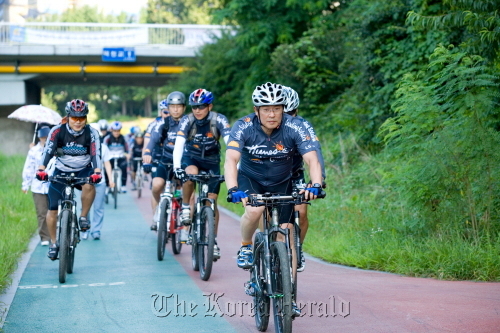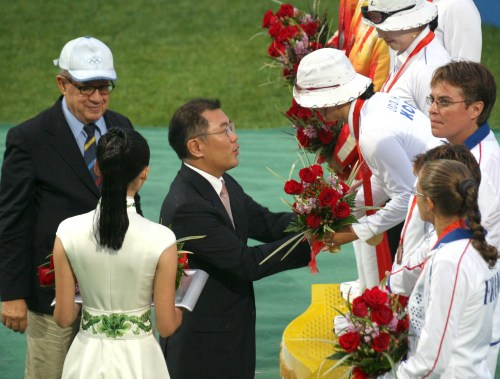 |
LS Cable and System chairman Koo Cha-yol (front) rides with the company’s cycling club in Anyang, Gyeonggi Province in 2008. (LS Cable and System) |
Conglomerate chiefs bring funds, facilities and passion to sports
Sports in Korea, as with many other areas of Korean society, have advanced at a rapid pace.
In some fields such as archery, golf and wrestling, the country has grown to be a force to be reckoned with on the international stage in a relatively short period of time.
While the sports themselves are very different, they have one common theme: backing from a business tycoon.
Archery in the Olympic Games has been dominated by Korea for decades with its athletes bringing home 16 gold medals, nine silver medals and five bronze medals since the Los Angeles games in 1984.
Korea’s rise as the archery powerhouse has been closely linked to the support of various members of the Chung family of Hyundai conglomerates.
The Korea Archery Association was first chaired by Rep. Chung Mong-joon of the Grand National Party, who is the largest shareholder of Hyundai Heavy Industries Co.
He was replaced by his elder brother Chung Mong-koo of Hyundai Motor Group, who served four consecutive terms from 1985 to 1997. In leading the organization and sponsoring the sport, Chung not only provided billions of won in support but also took a personal interest in the teams, attending major competitions and paying close attention to the quality of equipment.
After a nine-year hiatus, the Chung family returned to the archery association when the elder Chung’s son Chung Eui-sun took the post of chairman in 2005.
 |
Hyundai Motor Co. vice chairman Chung Eui-sun speaks with a Korean archery team member at the2008 Beijing Olympic Games. (Hyundai Motor Co.) |
The Chungs are not unique in taking an interest in sports and heading various sporting organizations.
From 1982 to 1997, Samsung Electronics chairman Lee Kun-hee, who wrestled during his years studying at Japan’s Waseda University, served as the chief of the Korea Wrestling Federation. Lee, a member of the International Olympic Committee, is also credited with playing a significant role in bringing the 2018 Winter Olympics to PyeongChang.
Hanjin Group’s Cho Yang-ho has been leading the Korea Table Tennis Association since 2008, while Kumho Asiana Group chairman and head of the Korea Professional Golf Association Park Sam-koo is widely credited with vitalizing the country’s professional golf scene, increasing the number of local competitions and hosting the Ballantine’s Championship -― a leg of the European tour ―- in Korea.
Some of the less popular sports have benefited significantly from the involvement of business tycoons.
Handball, despite Korea’s success in the sport, is far from mainstream and until recently the country did not have a dedicated stadium.
The situation changed last month when Korea’s first handball stadium was completed by SK Group under the direction of its chairman Chey Tae-won, who is also the chief of the Korea Handball Federation.
However, sponsorship from businesses is not limited to sports that bring in the medals and trophies.
One such sport is cycling, in which Korea has yet to win an Olympic medal.
However, since LS Cable and System chairman and chief executive Koo Cha-yol took office as the head of the Korea Cycling Federation, there have been developments that bode well for the sport here. Since then Korean athletes have taken top spots in two international cycling competitions.
Koo, who is a keen cyclist who became the first East Asian to take part in the eight-day, 650 kilometer trans-Alps cycling competition in 2002, took the post in 2009.
In addition, Koo has been focusing on next year’s London Olympics. In April 2010, he established a sponsor organization to cover the 5.5 billion won ($4.9 million) estimated to be needed to set up the team and its training, a significant part of which will be raised by Koo personally.
By Choi He-suk (
cheesuk@heraldcorp.com)








![[Weekender] Korea's traditional sauce culture gains global recognition](http://res.heraldm.com/phpwas/restmb_idxmake.php?idx=644&simg=/content/image/2024/11/21/20241121050153_0.jpg)
